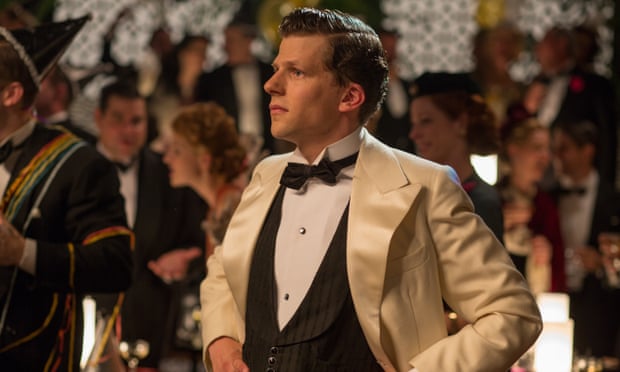Cafe Society
Woody Allen's Cafe Society is really nothing we haven't seen before: the tale of a hapless romantic Bobby (Jesse Eisenberg) who moves to Hollywood in search of work and ends up falling in love with the charming Vonnie (Kristen Stewart) has been told countless times before. The setting of late 30's America, rich furs and jazz music aplenty, is far from original too. Clearly, Allen's latest is far from ambitious and retreads familiar ground for the director but the film just manages to prove its worth with two likeable protagonists and gorgeous cinematography.
 If anyone were to play Allen in a biopic of his life, it could only be Eisenberg. As Bobby, he adopts the fretful gait and frenetic, half-stuttering voice that is instantly recognisable from any number of Allen's past roles.
If anyone were to play Allen in a biopic of his life, it could only be Eisenberg. As Bobby, he adopts the fretful gait and frenetic, half-stuttering voice that is instantly recognisable from any number of Allen's past roles. The impression is far from perfect and lacks some of the charm of Allen but it doesn't feel too much of a departure from Eisenberg's usual, awkward style and creates enjoyable friction with the self-assured nature of the glamorous world he finds himself in.
Ultimately though, it is Stewart who steals the show as Vonnie, looking effortlessly cool and collected next to Eisenberg's freneticism. By far the most interesting character, Stewart feels like a more mature but equally as enchanting Daisy Gatsby, though she refuses to be drawn too far into the Hollywood scene. The blossoming chemistry between Bobby and Vonny against a backdrop of golden beaches and grand mansions keeps the film together to such a degree that when neither are on screen, there is little to entertain.
The side-narratives involving Bobby's family, including his shady brother Sam and sister Evelyn, feel increasingly unnecessary and out of place, with random glimpses of Sam's violent gang activity feeling entirely inappropriate. Bobby's bickering parents are especially irritating and unamusing, appearing as an attempt by Allen to reassure audiences that his sense of humour is still intact.
In fact, the best way to approach Cafe Society is by expecting a slight, charming romance with light wit along the way. Even with a supporting role from Steve Carell, it is far from a laugh out loud experience like many of Allen's older films. Think less Diane Keaton and lobsters, more soft jazz and golden candlelight.
The 30's setting is beautifully realised through the cinematography of the legendary Vittorio Storaro, who holds three Academy Awards for his work on films such as Apocalypse Now. This being his first collaboration with Allen, and his first digitally shot feature, Storaro really accentuates the romanticism of LA and the energy of the clubs and parties that Bobby finds himself in. A few classic Woody Allen touches, including narration from the director himself, hold a certain nostalgic warmth but also remind how far within his comfort zone Cafe Society is.
Cafe Society feels like an offbeat impression of Allen's past work. Kooky characters, wild romanticism and tangled love combine for a sweet but ultimately forgettable experience. Though it won't be remembered as one of his finest, it's a decent way to pass the time.

Comments
Post a Comment